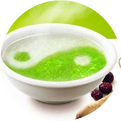Click the “blue text” above to follow me
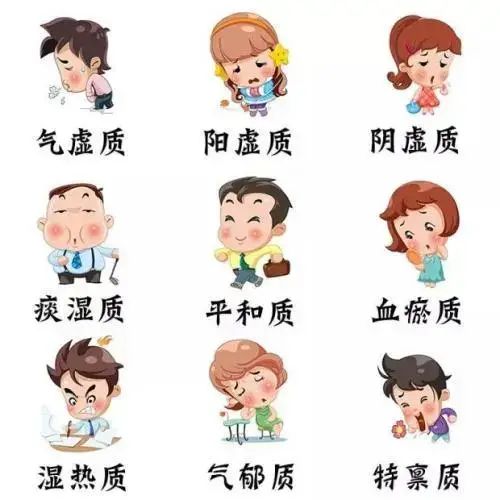
In Traditional Chinese Medicine (TCM), differentiation of syndromes is emphasized, and since each person’s constitution is different, various methods are needed for health maintenance. Currently, there are nine main constitutions among the Chinese population, with the relatively healthy balanced constitution accounting for 32.75%. After reading this, you will be able to improve your lifestyle according to your constitution. We can all manage our bodies well, but the key is: persistence!
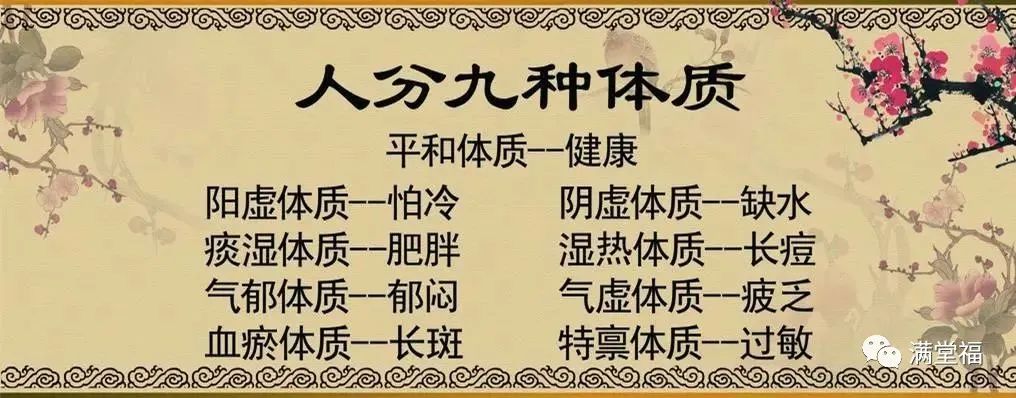
Today, let’s learn about one of the nine constitutions: Yin Deficiency Constitution. Let’s take a look together~

Yin Deficiency Constitution
What is Yin Deficiency Constitution?
· Dryness, lack of moisture, internal heat, sensitivity to heat.
· The Yin Deficiency Constitution refers to the deficiency of Yin fluids such as essence and blood in the body, losing the ability to nourish the organs, meridians, and skin, leading to the manifestation of internal heat.
· It may appear healthy on the surface.
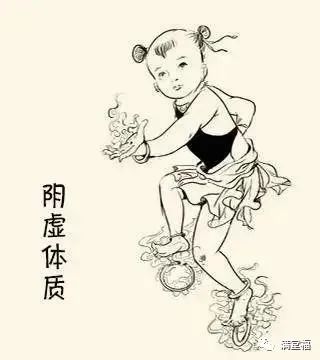
-
The Yin Deficiency Constitution is often due to congenital insufficiency, such as when parents have insufficient Qi and blood during conception, or due to advanced maternal age, premature birth, etc.; or it can be acquired due to excessive sexual activity, overindulgence, high stress in work and life, irregular lifestyle, prolonged labor leading to Yin deficiency, or after major illnesses, especially those involving hemorrhagic diseases; or due to youth when Yang energy is strong leading to Yin deficiency.
-
Yin and Yang represent water and fire. “Yin” is like water, which in the body includes essence, blood, and bodily fluids. The Yin Deficiency Constitution is characterized by a deficiency of these fluids, leading to internal heat and dryness.
-
Physical characteristics: Generally slender and tall.
-
Psychological characteristics: Impulsive, extroverted, and lively.
-
Common Symptoms:
-
Yin deficiency dryness: Individuals may experience dry mouth and throat, slightly dry lips and nose, dry eyes, constipation, scanty urination, dry skin, and tendency to develop wrinkles.
-
Yin deficiency internal heat: Symptoms may include heat in the palms and soles, flushed complexion, and a feeling of heat.
-
Individuals with Yin deficiency may also experience thirst with a preference for cold drinks, dizziness, tinnitus, poor sleep, a red tongue with little moisture and coating, and a thin, rapid pulse.
-
Adaptability: Generally intolerant to heat, better in winter than summer; sensitive to dryness.
-
Prone to diseases: Individuals are prone to conditions related to Yin deficiency and dryness heat, or may exhibit symptoms of Yin deficiency after illness, with tendencies towards recurrent canker sores, habitual constipation, and dry syndrome.
-
Yin is like the moisture in life; when Yin fluids are deficient, the body loses its nourishing moisture, similar to cooking with too much fire and too little water. Therefore, the main manifestations of Yin deficiency are divided into two categories: dryness and internal heat. Symptoms include dry mouth and throat, slightly dry nose, dry stools, scanty urination, dizziness, dry eyes, blurred vision, dry skin, tendency to develop wrinkles, red tongue with little moisture, and thin pulse; at the same time, due to Yin not restraining Yang, the Yang heat is relatively strong, leading to internal heat symptoms such as heat in the palms and soles, thirst with a preference for cold drinks, flushed complexion, and poor sleep.
-
Individuals with Yin deficiency are generally slender, and the internal heat manifests as impulsive, extroverted, and lively behavior, similar to the character Sun Wukong from the classic novel “Journey to the West”; they dislike the intense heat of summer and the dryness of autumn, preferring the cold and dampness of winter, as winter’s cold can restrain internal heat, making them feel comfortable.
Challenges of Yin Deficiency Constitution
· Five hearts (palms, soles, chest) feel hot, prefer to walk barefoot on cool floors.
· Prone to dry mouth and throat, thirsty, love cold water and drinks.
· Bad breath, oral ulcers. Red tongue with little moisture and coating.
· Dry stools, scanty and dark urine.
· Pale or red skin, often feeling hot, flushed complexion.
· Dry eyes, many red blood vessels, cloudy vision, dizziness, tinnitus.
· Poor sleep, short sleep duration, night sweats.
· Lack of patience, easily irritated.
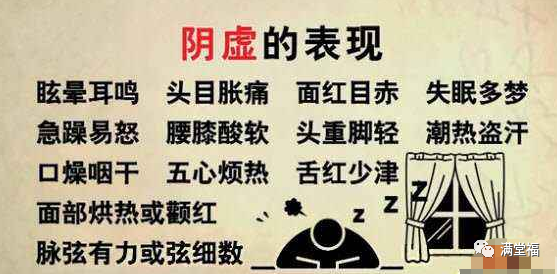
Why does Yin Deficiency occur?
· Congenital endowment, inherited from parents.
· Long-term emotional repression. Inability to express emotions can lead to internal heat, consuming Yin essence.
· Long-term poor heart function, or excessive use of diuretics in hypertensive patients.
· Long-term consumption of spicy and hot foods.
· Frequent late nights.
· Previous excessive indulgence.
· Excessive use of diuretics or heat-clearing and dampness-eliminating formulas.
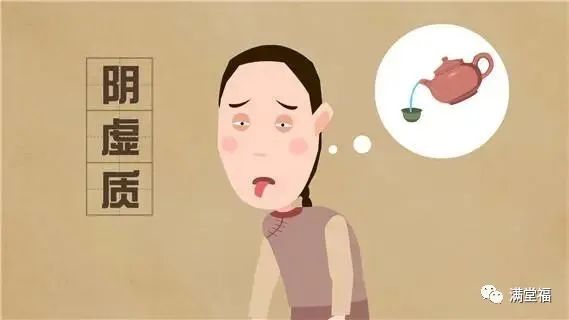
Things to be cautious about with Yin Deficiency
· Tuberculosis, such as pulmonary tuberculosis, intestinal tuberculosis, bone tuberculosis, lymphatic tuberculosis, etc.
· Tumors: Individuals with Yin deficiency who have long-term emotional repression and blood stasis tendencies are at higher risk for tumors. Therefore, any unexplained lumps, hard masses, or unexplained fevers, blood in stool or urine, weight loss, or pain should be taken seriously, and timely examination and diagnosis are necessary.
· High blood lipids, high blood pressure, diabetes. When Yin deficiency reaches a certain level, regardless of body type, blood viscosity and lipid levels can still be high.
· Hyperthyroidism: In TCM, Yin deficiency leads to excessive internal heat, causing emotional agitation and poor sleep.
· Yin deficiency insomnia: Often due to insufficient liver blood, primarily manifesting as irritability, night sweats, dry mouth, thirst, and palpitations.
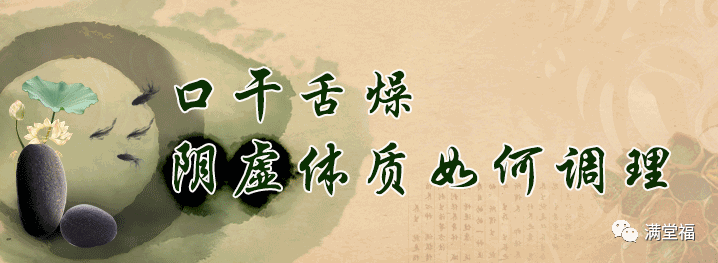
How to improve this?
Principles of Adjustment
Nourish Kidney Yin, strengthen water to control fire.
The Yin Deficiency Constitution generally has less water and more fire, so traditional physicians have created the basic principle of “strengthening water to control Yang fire,” such as commonly used formulas like Liu Wei Di Huang Wan (Six Flavor Rehmannia Pill) and Da Bu Yin Wan (Great Tonifying Yin Pill). This is similar to adding water to a pot that is low on water to avoid dryness and excessive fire leading to internal heat. However, when adjusting the body for Yin deficiency, the following points should be noted:
(1) Nourishing Yin and clearing heat should be used together: Since Yin deficiency generates internal heat, nourishing Yin should be combined with heat-clearing methods or Yin-nourishing and moisturizing methods. Therefore, for individuals with Yin deficiency, in addition to choosing products that nourish Yin and moisturize, such as flaxseed oil and collagen, heat-clearing products like bamboo leaf tea can also be used together to achieve a health-promoting effect of nourishing Yin and clearing heat.
(2) Nourishing blood can generate fluids: Due to the physiological and pathological interrelations in the body, true Yin deficiency can involve deficiencies in essence, blood, and bodily fluids. Therefore, while treating Yin deficiency, it is important to combine methods that replenish essence, nourish blood, and nourish Yin.
(3) Nourishing Yin while regulating Qi and strengthening the spleen: Many Yin-nourishing herbs are soft and greasy, and prolonged use can harm spleen Yang, leading to poor appetite, abdominal bloating, and diarrhea.
Methods of Adjustment
-
Mental regulation: Individuals with Yin deficiency tend to be impulsive, extroverted, and lively, often feeling irritable. This is due to excessive mental stress, which can lead to internal heat and consume Yin blood, exacerbating the tendency towards Yin deficiency. Therefore, calming the mind and stabilizing emotions is important. Learning to properly handle joy and sorrow, bitterness and happiness, and acceptance and resistance can help maintain a stable mindset.
-
Dietary regulation: According to the “Book of Longevity and Health,” it is stated: “Those who are good at treating diseases are not as good as those who are good at preventing them; those who are good at treating with medicine are not as good as those who are good at treating with food.” Yin and Yang are opposing and restraining forces. For those with Yin deficiency, Yang energy can easily become excessive. Kidney Yin is the foundation of all Yin energy in the body, and individuals with Yin deficiency should consume foods that nourish Kidney Yin to nourish Yin and subdue Yang. Commonly chosen foods include sesame, glutinous rice, mung beans, squid, turtle, sea cucumber, abalone, goji berries, snow frog, crab, milk, oysters, clams, sea jellies, duck meat, pig skin, tofu, sugarcane, peaches, white fungus, vegetables, and fruits. These foods are generally sweet, cold, and nourishing, which can help replenish Yin energy. It is also advisable to combine targeted nourishing Yin dishes with medicinal foods. Individuals with Yin deficiency and excessive internal heat should avoid spicy foods.
-
Lifestyle regulation: Individuals with Yin deficiency should ensure adequate sleep to nourish Yin energy. Stressful work, late nights, intense exercise, and hot working environments can exacerbate Yin deficiency tendencies and should be avoided. Especially in autumn and winter, it is crucial to protect Yin essence, so health practitioners emphasize “nourishing Yin in autumn and winter.” Kidney Yin is the foundation of all Yin energy, and those with Yin deficiency should moderate sexual activity to preserve essence. Individuals with Yin deficiency should also avoid smoking and limit alcohol consumption, as both are damp-heat products that can lead to internal dryness and heat, resulting in dry mouth and throat or coughing up blood.
-
Is dietary adjustment enough to address Yin deficiency? Certainly not; dietary nourishment is one aspect, and exercise is also very important. Whether Yin or Yang deficiency, simply lying down to recuperate is not sufficient. Moderate exercise is beneficial for enhancing physical fitness and regulating Yin and Yang, increasing energy levels. However, exercise should be done in moderation.
-
Exercise regulation: Due to the deficiency of Yin fluids such as essence, blood, and bodily fluids, individuals with Yin deficiency may experience thirst, flushed complexion, and scanty urination during exercise. They should engage in moderate-intensity, intermittent physical activities, such as Tai Chi, Tai Chi sword, Ba Duan Jin, and Qigong, which combine movement and stillness. Practicing the “Six Character Secret” with the “Xu” character can help nourish liver Qi. During exercise, it is important to control sweating and replenish fluids in a timely manner. Individuals with Yin deficiency tend to be thin and prone to internal heat and dry skin. Swimming can be a good option to moisturize the skin and reduce itching, but sauna is not recommended. Qigong exercises can have a bidirectional regulatory function on the body’s endocrine system, promoting spleen and stomach function and increasing fluid production, improving Yin deficiency.
-
Individuals with Yin deficiency, due to excessive Yang energy, should avoid intense exercise and refrain from high-intensity workouts, especially in hot summer or humid environments, to prevent excessive sweating and damage to Yin fluids.
Dietary Principles:
· Avoid spicy and dry foods: Warm, dry, spicy, and rich foods can harm Yin and should be eaten sparingly. If consuming too many hot foods leads to internal heat, balance it with some cooling fruits.
· Minimize the use of seasonings in cooking to maintain the original flavor, and avoid frying and barbecuing. Even non-hot foods can become heating and harm Yin when fried or barbecued.
· Choose foods that are neutral or slightly cool, nourishing, and blood-replenishing.
· While most fruits are suitable for those with Yin deficiency, they should not be the main food source, as grains are the most nourishing. Especially for those with both Yin and Yang deficiency, it is important to consume porridge made from grains to nourish and hydrate.
· Avoid excessive consumption of very cold foods, especially cold drinks and foods just taken out of the refrigerator, as they can further harm the spleen and stomach.
· Avoid excessive exercise and excessive sweating:
Individuals with Yin deficiency may experience early joint stiffness and should avoid activities that put stress on the knee joints (like going down stairs, climbing mountains, or using a treadmill) as they age. They should not practice in extreme heat during summer or extreme cold during winter.
The phrase “practice in the cold of winter and the heat of summer” refers to the importance of persistence in training, regardless of the weather. Practicing in the cold of winter and the heat of summer not only strengthens the body but also enhances adaptability to extreme weather conditions.
Additionally, there is a deeper spiritual meaning: it trains people to be unafraid of cold and heat, fostering a strong will. Thus, determined fitness enthusiasts adhere to this ancient teaching, consistently exercising regardless of the harsh winter or scorching summer.
· Avoid staying up late:
Sleeping before 11 PM is the baseline. Staying up late consumes liver blood, naturally leading to excessive internal heat.
· Maintain a calm demeanor:
Be mindful of your emotions and remind yourself to stay calm. Reduce complaints and anger.
(Warm reminder: This article is for reference only. TCM emphasizes syndrome differentiation and treatment, alleviating symptoms without shortcuts. Individual conditions vary, and patients should consult a physician to find the most suitable treatment method.) Some images and text are sourced from the internet, and copyright belongs to the original authors. If there is any infringement, please inform us.

